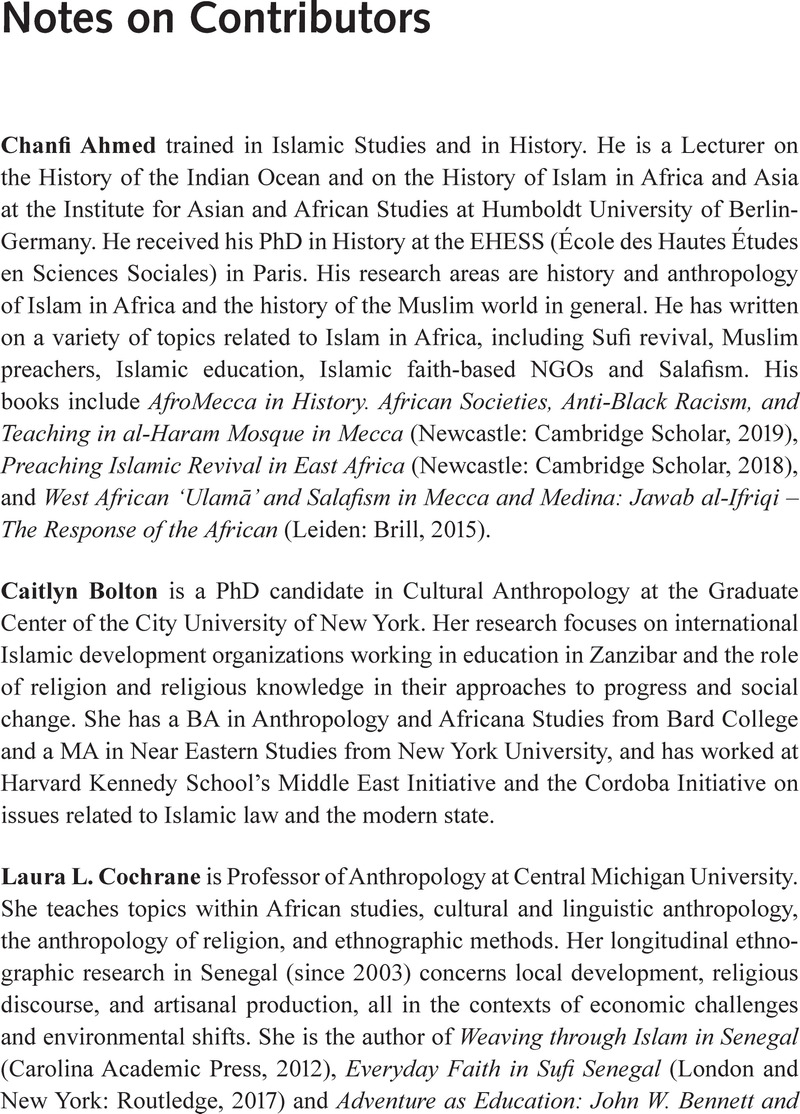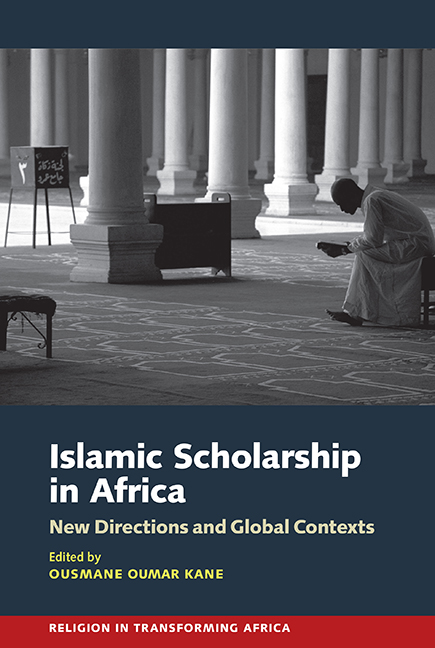Book contents
- Frontmatter
- Dedication
- Contents
- List of Illustrations
- Notes on Contributors
- Note on Transliteration and Calendar
- List of Abbreviations
- Acknowledgements
- Introduction: Where have we been and where are we going in the Study of Islamic Scholarship in Africa?
- Part I History, Movement, and Islamic Scholarship
- Introduction
- 1 The African Roots of a Global Eighteenth-Century Islamic Scholarly Renewal
- 2 Muḥammad al-Kashnāwī and the Everyday Life of the Occult
- 3 The African Community and African ‘Ulamā’ in Mecca: Al-Jāmī and Muḥammad Surūr al-Ṣabbān (Twentieth Century)
- 4 The Transformation of the Pilgrimage Tradition in West Africa
- Part II Textuality, Orality, and Islamic Scholarship
- Introduction
- 5 ‘Those Who Represent the Sovereign in his Absence’: Muslim Scholarship and the Question of Legal Authority in the Pre-Modern Sahara (Southern Algeria, Mauritania, Mali), 1750–1850
- 6 Philosophical Sufism in the Sokoto Caliphate: The Case of Shaykh Dan Tafa
- 7 ‘If all the Legal Schools were to Disappear’: ʿUmar Tāl’s Approach to Jurisprudence in Kitāb al-Rimāḥ
- 8 A New African Orality? Tijānī Sufism, Sacred Knowledge and the ICTs in Post-Truth Times
- 9 The Sacred Text in Egypt’s Popular Culture: The Qur’ānic Sounds, the Meanings and Formation of Sakīna Sacred Space in Traditions of Poverty and Fear
- Part III Islamic Education
- Introduction
- 10 Modernizing the Madrasa: Islamic Education, Development, and Tradition in Zanzibar
- 11 A New Daara: Integrating Qur’ānic, Agricultural and Trade Education in a Community Setting
- 12 Islamic Education and the ‘Diaspora’: Religious Schooling for Senegalese Migrants’ Children
- 13 What does Traditional Islamic Education Mean? Examples from Nouakchott’s Contemporary Female Learning Circles
- Part IV ‘Ajamī, Knowledge Transmission, and Spirituality
- Introduction
- 14 Bringing ʿIlm to the Common People: Sufi Vernacular Poetry and Islamic Education in Brava, c. 1890–1959
- 15 A Senegalese Sufi Saint and ‘Ajamī Poet: Sëriñ Moor Kayre (1874–1951)
- 16 Praise and Prestige: The Significance of Elegiac Poetry among Muslim Intellectuals on the Late Twentieth-Century Kenya Coast
- Conclusion: The Study of Islamic Scholarship and the Social Sciences in Africa: Bridging Knowledge Divides, Reframing Narratives
- Glossary
- Bibliography
- Index
- Miscellaneous Endmatter
Notes on Contributors
Published online by Cambridge University Press: 26 May 2021
- Frontmatter
- Dedication
- Contents
- List of Illustrations
- Notes on Contributors
- Note on Transliteration and Calendar
- List of Abbreviations
- Acknowledgements
- Introduction: Where have we been and where are we going in the Study of Islamic Scholarship in Africa?
- Part I History, Movement, and Islamic Scholarship
- Introduction
- 1 The African Roots of a Global Eighteenth-Century Islamic Scholarly Renewal
- 2 Muḥammad al-Kashnāwī and the Everyday Life of the Occult
- 3 The African Community and African ‘Ulamā’ in Mecca: Al-Jāmī and Muḥammad Surūr al-Ṣabbān (Twentieth Century)
- 4 The Transformation of the Pilgrimage Tradition in West Africa
- Part II Textuality, Orality, and Islamic Scholarship
- Introduction
- 5 ‘Those Who Represent the Sovereign in his Absence’: Muslim Scholarship and the Question of Legal Authority in the Pre-Modern Sahara (Southern Algeria, Mauritania, Mali), 1750–1850
- 6 Philosophical Sufism in the Sokoto Caliphate: The Case of Shaykh Dan Tafa
- 7 ‘If all the Legal Schools were to Disappear’: ʿUmar Tāl’s Approach to Jurisprudence in Kitāb al-Rimāḥ
- 8 A New African Orality? Tijānī Sufism, Sacred Knowledge and the ICTs in Post-Truth Times
- 9 The Sacred Text in Egypt’s Popular Culture: The Qur’ānic Sounds, the Meanings and Formation of Sakīna Sacred Space in Traditions of Poverty and Fear
- Part III Islamic Education
- Introduction
- 10 Modernizing the Madrasa: Islamic Education, Development, and Tradition in Zanzibar
- 11 A New Daara: Integrating Qur’ānic, Agricultural and Trade Education in a Community Setting
- 12 Islamic Education and the ‘Diaspora’: Religious Schooling for Senegalese Migrants’ Children
- 13 What does Traditional Islamic Education Mean? Examples from Nouakchott’s Contemporary Female Learning Circles
- Part IV ‘Ajamī, Knowledge Transmission, and Spirituality
- Introduction
- 14 Bringing ʿIlm to the Common People: Sufi Vernacular Poetry and Islamic Education in Brava, c. 1890–1959
- 15 A Senegalese Sufi Saint and ‘Ajamī Poet: Sëriñ Moor Kayre (1874–1951)
- 16 Praise and Prestige: The Significance of Elegiac Poetry among Muslim Intellectuals on the Late Twentieth-Century Kenya Coast
- Conclusion: The Study of Islamic Scholarship and the Social Sciences in Africa: Bridging Knowledge Divides, Reframing Narratives
- Glossary
- Bibliography
- Index
- Miscellaneous Endmatter
Summary

- Type
- Chapter
- Information
- Islamic Scholarship in AfricaNew Directions and Global Contexts, pp. xi - xviPublisher: Boydell & BrewerPrint publication year: 2021

